

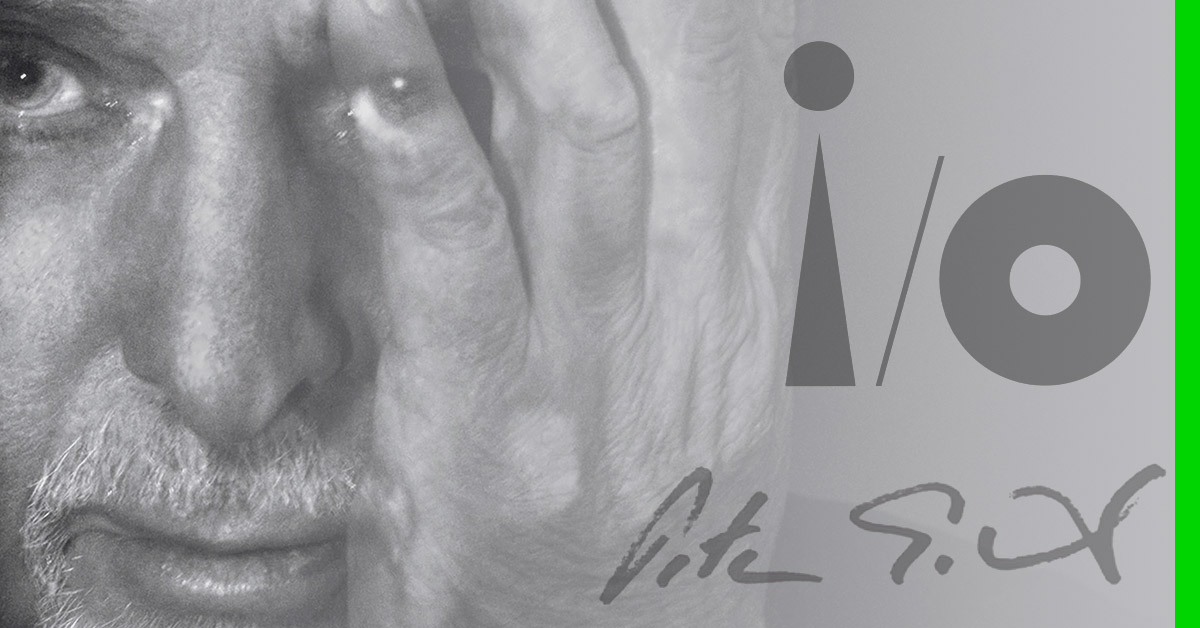
Not only did Peter Gabriel finally release his long-awaited album i/o on 1 December 2023 - it also comes in several mix variants. We do the same and offer two reviews. Both look at the complete release of the double album with its bright-side and dark-side mixes.
This is the bright-sided review. See the dark-sided one here [link will follow on publication].
When an artist as versatile and idiosyncratic as Peter Gabriel completes an album of new original compositions for the first time in over 20 years, fans' expectations are naturally high. Accordingly, Gabriel's announcement in January 2023 that he would release all the songs in stages and in different mixes over the course of the year, on full and new moons, was greeted with mixed reactions.
Now, almost a year later, i/o is available as a cohesive album, and once again the format has been met with both enthusiasm and criticism. While some find the decision for a double album with light and dark side mixes consistent, correct and interesting, others would have preferred a "definitive" version. So i/o has been the subject of lively debate for some time now, in some cases quite independently of the music contained on the album. Reason enough to take a closer look, which almost inevitably leads to the question of how deeply you want to immerse yourself in the music, and how much expectations and habits can influence the listening experience and the way you deal with the album.
As already mentioned, i/o is basically designed as a double album that contains both the bright-side mixes and the dark-side mixes of the twelve released songs. Accordingly, the CD consists of two discs, while for the vinyl edition the dark-side and bright-side have each been separated into a double record.
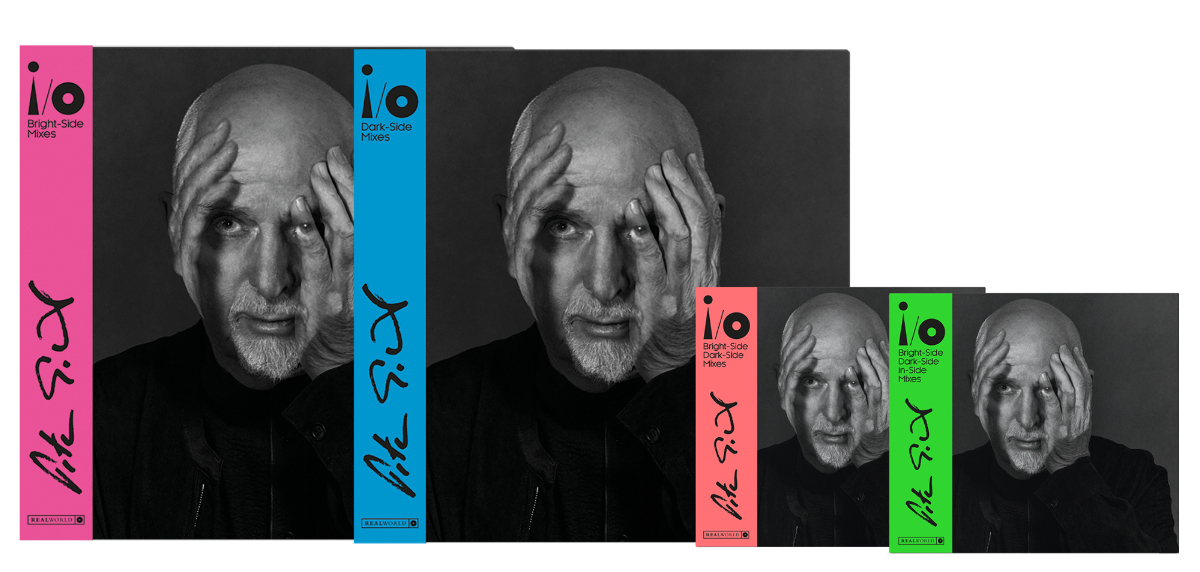 In addition to the two CDs, a further version of i/o contains a Blu-ray disc with the Dolby Atmos mixes. A box set has also been announced for spring 2024, in which all discs and all records will be available together with a hardcover book.
In addition to the two CDs, a further version of i/o contains a Blu-ray disc with the Dolby Atmos mixes. A box set has also been announced for spring 2024, in which all discs and all records will be available together with a hardcover book.
The different formats may pose a decision problem for some fans: as a vinyl lover, do you buy just one mix or both? Which of the two mixes do you actually listen to in the long run when you have bought the CD and then take it off the shelf again? Is the release of two mixes unnecessary or even too much for the listener?
What may sound complicated to some fans at first glance, and may even raise the question of an instruction manual, is actually very easy to answer: If you think the differences between the Bright and Dark Sides are too small or uninteresting, you can just listen to or buy one of the two mixes and not worry about which one is better, more correct or more suitable.
If you want to make a conscious effort to deal with the differences, you can take advantage of all the options and choose the Bright Side or Dark Side according to your mood, the mood of the day, the weather forecast or the random generator, or even create playlists of your favourite mixes in any order you like, completely independent of CD or vinyl.
There are a lot of options here and the aforementioned question of how deep you want to immerse yourself in the music ultimately sets the direction.
Having a choice is a luxury and in this case cannot really be considered a real problem that makes listening difficult. After all, there are also very simple ways and if you really want to, you can find your way.
To get straight to the point, i/o has a lot to offer beyond the Bright-Side, Dark-Side and In-Side formats already mentioned. Twelve new songs and a total playing time of almost 70 minutes are ample and impressive.
At a time when radio songs are getting shorter and shorter, people's attention spans seem to be getting shorter and shorter, and even stars like Sting tend to favour short album playing times for their latest works, Peter Gabriel, as with his previous album Up, has quite a lot to offer. And as the twelve new songs sound very different and multifaceted, listening to them is never boring.
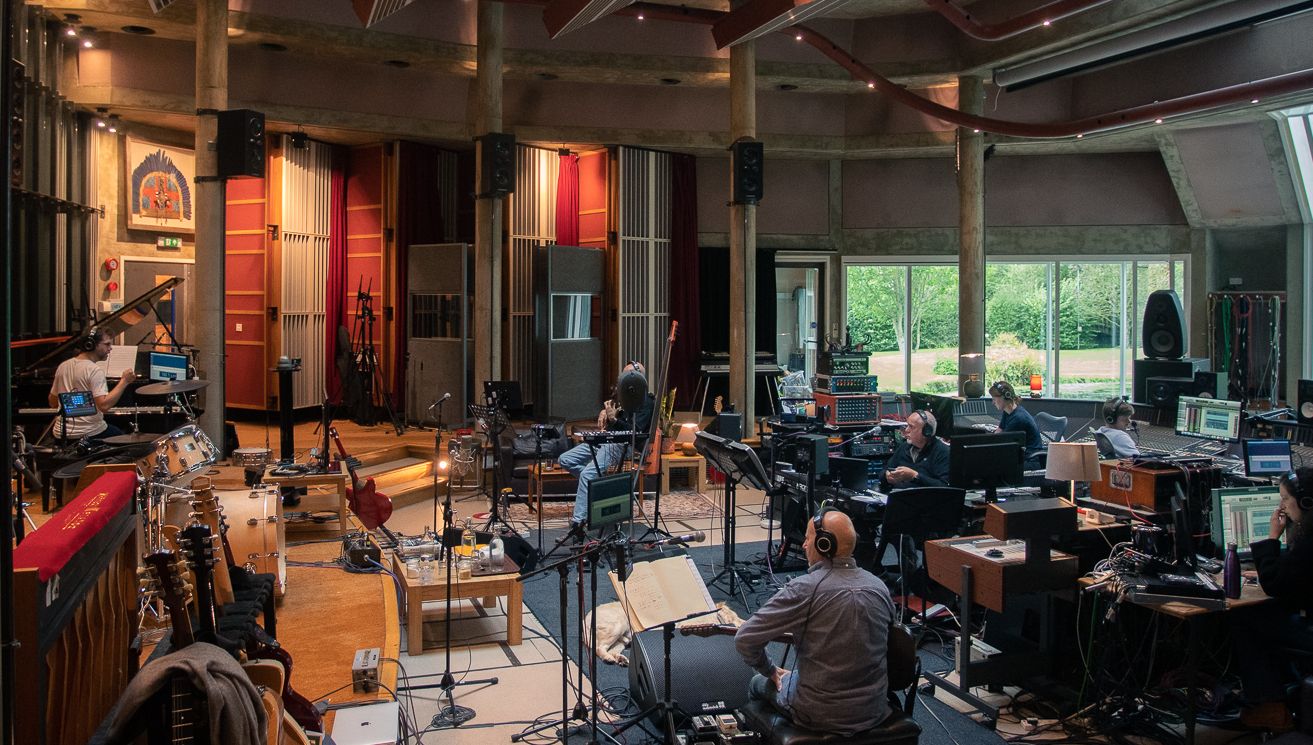 The spectrum ranges from rock-electronic songs with up-tempo parts like the opener Panopticom to ballads like So Much, danceable funk influenced numbers like Road To Joy, world music sounds like Olive Tree and spherical sound collages like Love Can Heal. In between, there are always impressive pieces that don't seem to fit into any category. Four Kinds Of Horses and The Court probably fall into the category of "Peter Gabriel music".
The spectrum ranges from rock-electronic songs with up-tempo parts like the opener Panopticom to ballads like So Much, danceable funk influenced numbers like Road To Joy, world music sounds like Olive Tree and spherical sound collages like Love Can Heal. In between, there are always impressive pieces that don't seem to fit into any category. Four Kinds Of Horses and The Court probably fall into the category of "Peter Gabriel music".
Lyrically, Gabriel moves away from the relationship issues that were the subject of US and the dark heaviness of Up. Among other things, i/o deals with various aspects of transience, terrorism, justice, the connection between man and nature, and new technologies that could lead to social change in the future.
What is most striking is that throughout the album you get the impression that this is a man at peace with himself, who approaches his music and its lyrics in a very reflective and life-affirming way.
With the support of such well-known and lesser-known collaborators as Tony Levin, David Rhodes, Manu Katché, Brian Eno, John Metcalfe, Linnea Olsson, Jennie Abrahamson, Ged Lynch and Josh Shpak, Gabriel achieves a very fresh, balanced and transparent sound. Despite the variety of instruments, timbres and voices in all three mixes, the individual tracks never feel overloaded.
The accompanying musicians bring to life what you love about them and what you want to hear from them. Powerful bass lines, song-like yet interesting guitar accompaniment, atmospheric sounds and relaxed drum grooves.
The unmistakable voice of Peter Gabriel always takes centre stage. He is in extremely impressive form and disproves any fears that i/o might be a vocally weaker work, showing a certain age-related fatigue. This is definitely not the case.
If you want to find Peter Gabriel with all his typical characteristics and idiosyncrasies, you will find him on i/o.
At the same time, the twelve new songs do not sound like an unimaginative copy of earlier successes, but are independent. There are minor elements that you will definitely have heard before (the vocal melody on Road To Joy, for example, is reminiscent of Kiss That Frog, and there are guitar riffs on Panopticom that you will quickly associate with Digging In The Dirt), but the songs still stand on their own and Gabriel is far from repeating himself.
One of the reasons is that there are so many things he has never tried before in this form. There has never been a Peter Gabriel song with the same title as an album. And even individual styles, such as the casually grooving Motown offshoot This Is Home, have never been part of Gabriel's repertoire.
Throughout the album, it is clear that Gabriel wanted to make full use of his experience with his orchestral project New Blood for i/o. Strings can be heard in almost every song, sometimes more and sometimes less in the foreground. The use of the cello in Love Can Heal is particularly noteworthy. However, this is a recording made during the joint tour with Sting in 2016.
It should be noted that very different elements and splashes of colour are used purely instrumentally and vocally. From rock band and electronics to gospel choir, orchestra and percussion: The variety on i/o is enormous.
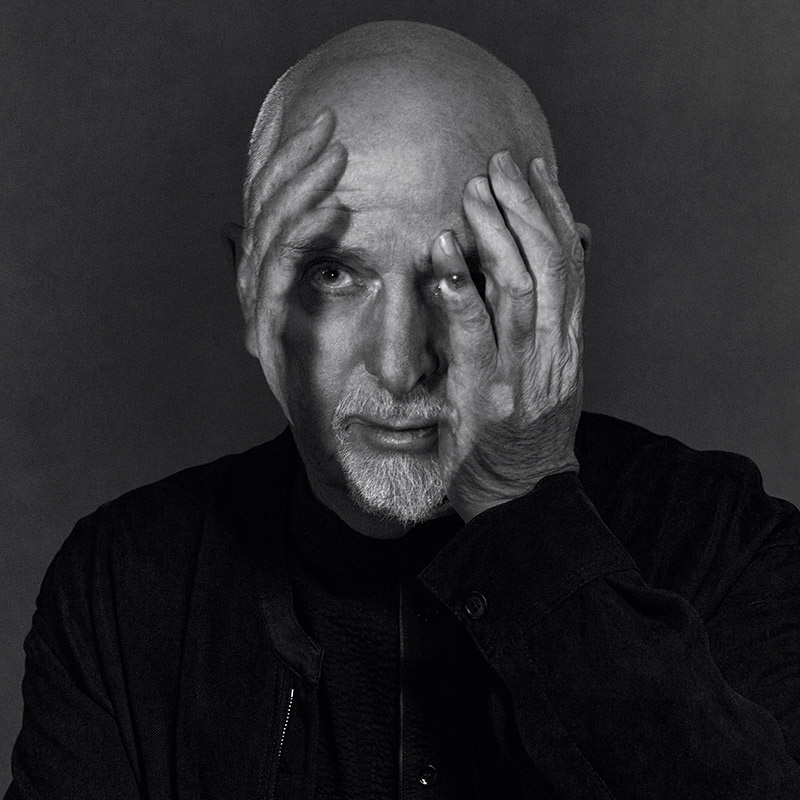 The cover of i/o is certainly interesting. The image is somewhat reminiscent of Gabriel's third album, the position of the face/upper body is comparable to So, and the black and white tone is not far removed from Up. Based on these parallels, i/o fits into Gabriel's oeuvre as a whole.
The cover of i/o is certainly interesting. The image is somewhat reminiscent of Gabriel's third album, the position of the face/upper body is comparable to So, and the black and white tone is not far removed from Up. Based on these parallels, i/o fits into Gabriel's oeuvre as a whole.
It is debatable whether the rather life-affirming music goes well with the cover or whether a more colourful approach would have been better.
The booklet is colourful thanks to the illustrations of the various artworks that go with the songs, which are also presented for each full moon. It would have been nice to be able to read the lyrics in the CD booklet, but obviously they wanted to avoid making it too extensive. The lyrics are included on the discs.
Those who wanted to join the journey had a lot to look forward to in 2023. The effort that Gabriel has put into this is enormous and it has certainly been an enriching experience for many fans to be accompanied throughout the year by new songs, matching artwork, background information via video and also demo versions via Bandcamp. If you wanted to, you could immerse yourself in the music, learn about the development and production of each song, and at the same time be inspired by the visual art.
If you didn't want to do that, you still had the option of doing only part of the journey or waiting for the CD and vinyl releases.
Gabriel deserves a lot of credit for offering this variety and scope. This form of release was certainly not convenient and could have been done with much less effort. However, for many fans this would have blocked the way to a very exciting, comprehensive, year-long work of art that has probably never existed before in this form.
Peter Gabriel is an artist who has never taken the easy way out, who has always been demanding and always good for a surprise. This is also the case with i/o, which has a fresh and contemporary feel to it because it breaks away from the dogma of releases that no longer have to be used. The path via streaming and the like certainly has its advantages, but it also offers freedoms that can be exploited. Gabriel wouldn't be Gabriel if he ignored them and only looked at the format of the dying CD.
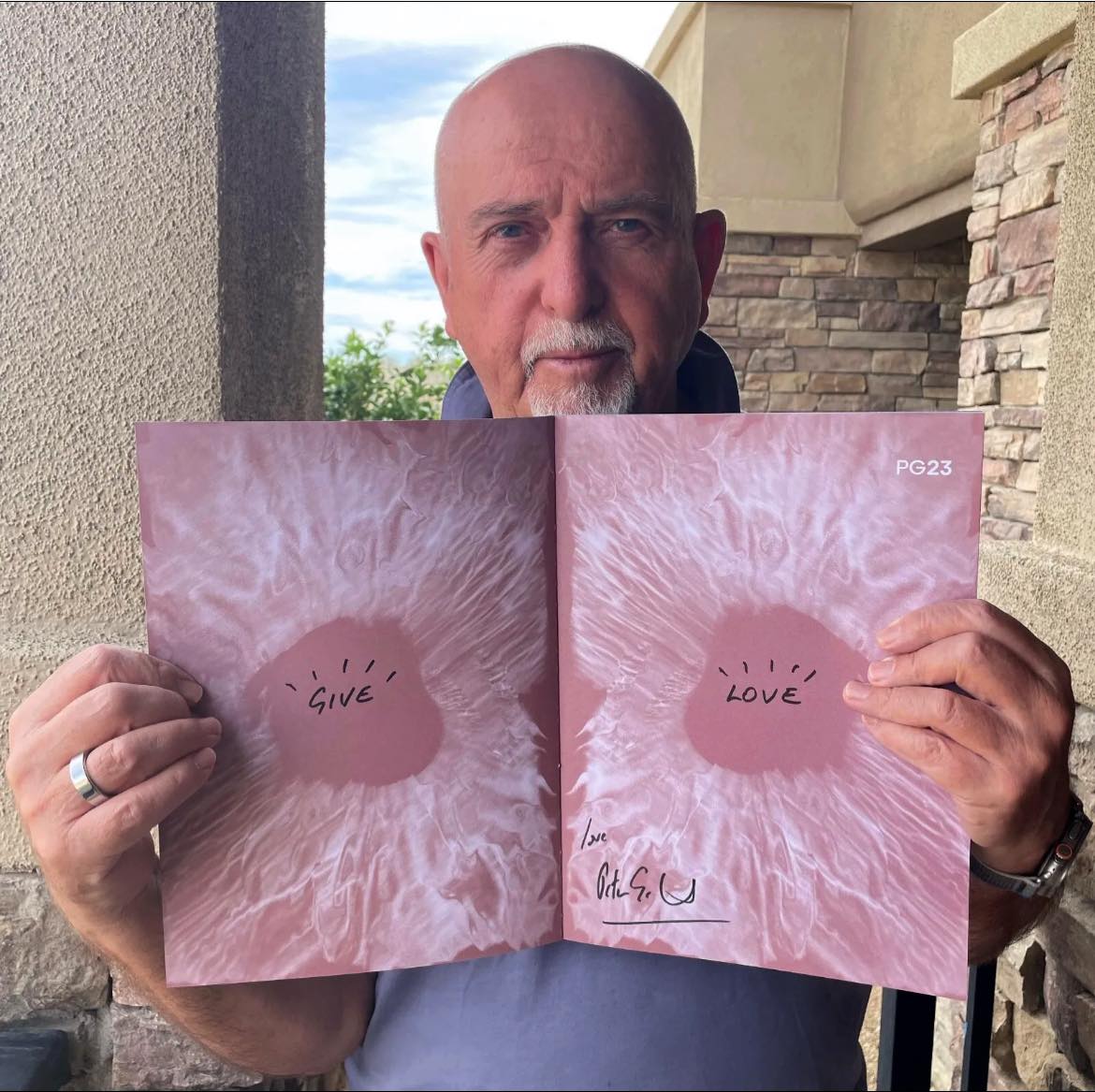 Gabriel didn't reinvent pop music with i/o. But what other artists are really reinventing anything? There are new hybrids and new sounds, but that's all you can expect from anyone. Peter Gabriel remains true to himself without copying himself. Only your own taste decides whether the music is convincing or not. The playing, singing and production are world class and you can clearly feel that someone has put a lot of thought into the songwriting and lyrics.
Gabriel didn't reinvent pop music with i/o. But what other artists are really reinventing anything? There are new hybrids and new sounds, but that's all you can expect from anyone. Peter Gabriel remains true to himself without copying himself. Only your own taste decides whether the music is convincing or not. The playing, singing and production are world class and you can clearly feel that someone has put a lot of thought into the songwriting and lyrics.
When you're 73 years old and have been in the business for ages, songs like Playing For Time and So Much definitely come across as authentic. Apart from that, every fan will be able to identify their own highlights on i/o - and also know for themselves which songs don't belong on their personal best-of playlists.
What is certain, however, is that i/o at least allows a great many forms of access via stylistics, mixes and so on. Whether or not you can make use of these depends to some extent on how flexible you are in terms of your own habits and how deeply you want to immerse yourself in the music. If you get involved with this album and do not get caught up in the search for a second San Jacinto or other comparable classics, you will be rewarded with a strong, fresh album that stands on its own.
Author: Martin Peitz
i/o - Track by Track (by Thomas Schrage and Martin Peitz)
See also further information on various aspects of i/o in our special, here.

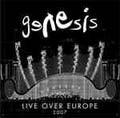

Live-Double-album of the 2007 Turn It On Again-Tour.
Review available


Multi-Artist-Album from 2000, with Elisabeth Frazer, Richie Havens, Paul Buchanan, Neneh Cherry and larla Lionáird. Gabriel himself sings on four.
Review available